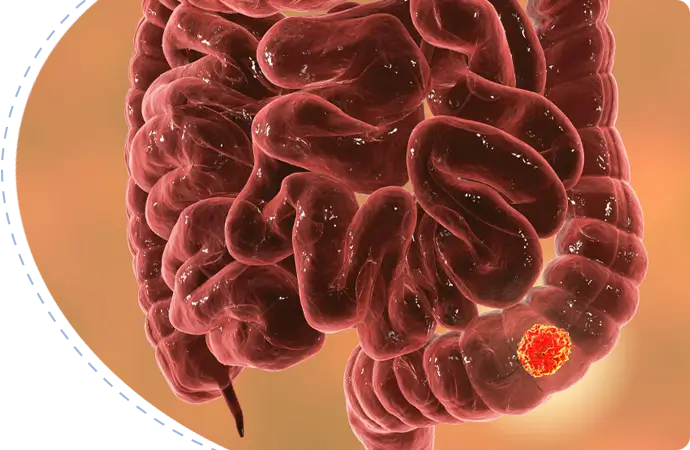
Rectal Cancer treatment in Bangladesh
Rectal cancer is a malignant tumor in the rectum, the last part of the large intestine. Most of the time it develops from precancerous polyps. It can spread to nearby lymph nodes and other organs if left untreated. Regular check-ups and rectal cancer treatments are very crucial for colorectal well-being.
We provide the best rectal cancer treatment in Bangladesh including surgery, and therapy depending on the stage with over 15 years of experience as rectal cancer specialists and surgeons in Bangladesh.

Rectal Cancer symptoms
Generally, there are several symptoms of rectal cancer. Here we mentioned the major symptoms of rectal cancer:
- Rectal Bleeding
- Changes in Bowel Habits
- Abdominal Discomfort
- Sense of incomplete defecation
- Unexplained Weight Loss
- Anemia
- Pelvic Pain
Rectal cancer stage-by-stage treatment process
Here is the stage-by-stage treatment process for rectal cancer
Stage 0 (Carcinoma in situ):
- Surgical polyp or cancerous tissue removal through procedures like local excision (TAE) Trans-Anal Minimally Invasive Surgery (TAMIS) or transanal endoscopic microsurgery (TEMS).
- In some cases, endoscopic mucosal resection (EMR) may be performed to remove larger polyps.
Stage I (Early Stage):
- Surgery is the primary treatment, typically a low anterior resection or an abdominoperineal resection (APR) to remove the tumor and nearby lymph nodes.
- In selected cases, Trans-Anal Minimally Invasive Surgery (TAMIS) or transanal endoscopic microsurgery (TEMS) or local excision may be considered for tumors confined to the rectal wall without lymph node involvement.
- Chemotherapy or radiation therapy may be recommended after surgery, depending on the risk factors and characteristics of the tumor.
Stage II (Locally advanced):
- Surgery remains the mainstay of treatment, similar to Stage I.
- Additional chemotherapy or radiation therapy may be recommended before or after surgery to reduce the risk of cancer recurrence, especially for tumors with high-risk features or involvement of nearby structures.
Stage III (Regional Spread):
- Multimodal treatment approach involving surgery, chemotherapy, and radiation therapy.
- Neoadjuvant chemoradiotherapy (chemotherapy and radiation therapy given before surgery) followed by surgery is a common approach to shrink the tumor, facilitate surgical removal, and reduce the risk of recurrence.
- Adjuvant chemotherapy may be recommended after surgery to eliminate any remaining cancer cells and reduce the risk of metastasis.
- Nowadays TNT (total neo-adjuvant therapy) in the form of chemotherapy followed by long-course chemoradiotherapy or short-course radiotherapy followed by chemotherapy is considered ideal for most stage III rectal cancer as well as mid and lower rectal stage II cancer before surgery.
- Surgery before any therapy can be considered for upper rectal stage II and stage III cancer.
- In some cases, adjuvant radiation therapy may also be considered based on the specific characteristics of the tumor and the patient's overall health.
Stage IV (Advanced or Metastatic):
- Combination therapy involves surgery, chemotherapy, radiotherapy, targeted therapy, and immunotherapy.
- Surgery may be performed to remove metastatic tumors in the liver, lungs, or other organs, especially if the metastases are limited in number and location.
- Chemotherapy regimens such as FOLFOX (combination of 5-fluorouracil, leucovorin, and oxaliplatin) or FOLFIRI (combination of 5-fluorouracil, leucovorin, and irinotecan) are commonly used.

Rectal Cancer survival rate by stage in Bangladesh
- Early Stage (Stage I and II): Stage I rectal cancer is approximately 90% to 95%, while the five-year survival rate for stage II rectal cancer is around 75% to 85%.
- Advanced Stage (Stage III and IV): The five-year survival rate for stage III rectal cancer is approximately 55% to 65%, while the five-year survival rate for stage IV rectal cancer is less than 15% to 30%.
Experienced Rectal Cancer specialist | Dr. Tariq Akhtar Khan
- Top-ranked Piles Specialist and Colorectal Surgeon in Bangladesh.
- Associate Professor at Mugda Medical College and Hospital.
- Fellow of the Royal College of Physicians and Surgeons of Glasgow.
- Over 15 years of expertise in specializing in Rectal Cancer treatment.
- High success rate with 8000+ Anal surgery and 650+ cancer surgery experience.
- BSMMU Certified Master Colorectal Surgeon; MS (Colorectal Surgery).
- He is renowned for his expertise in rectal cancer surgery in Bangladesh.
- His reputation among patients and peers can testify to his skills and success rate in treating rectal cancer.
- Chief Consultant at Dhanmondi Diagnostic Center, Impulse Hospital, Labaid Cancer Hospital. Super Specialized Hospital.




